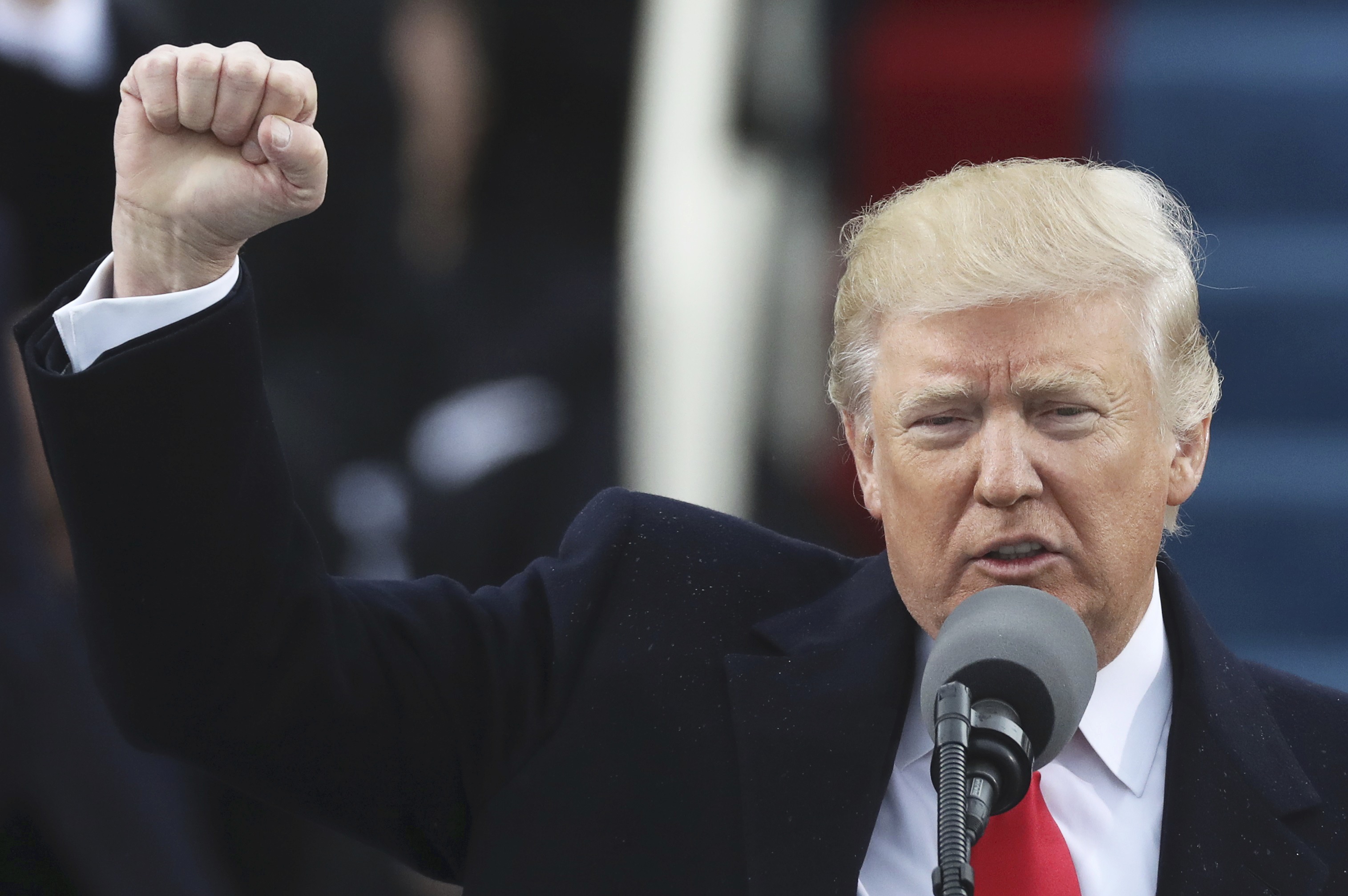
President Donald Trump speaks after his Jan. 20, 2017, swearing-in as the country's 45th president at the U.S. Capitol in Washington. (CNS/Carlos Barria, Reuters)
This commentary comes to you from the state best known for bluegrass music, blue blood horseracing, and warehouse distilled Jim Beam bourbon.
It concerns however, anything but whiskey.
I want to address criminal justice — or the lack thereof — and an impending presidential visit here today, Nov. 4.
Earlier last month, the city of Lexington (population 323,780) experienced two separate double homicides just several days apart. This central Kentucky city, located about 80 miles away from Louisville, is fast becoming known — like its neighbor to the north has for many years — as a place of escalating gun violence.
The last two victims, Dwayne Slaughter and Darrian Webb, were both age 18 and African-American males. They were killed in broad daylight on East 7th Street near Winchester Road, one of the city's busiest roadways. Witnesses told police that the victims appeared to have been targeted by the shooters.
Brenna Angel, spokesperson for the Lexington Police Department (LPD), told NCR that "Lexington is a very safe city, but as it is with most people who are involved in criminal activity, those individuals are more likely to become victims themselves."
Whether these two young men were involved in anything criminal remains in question. As for their murders, and the earlier two that occurred in an apartment complex across town, Angel said, investigations were ongoing.
On Oct. 21 the police department and Democratic Mayor Linda Gorton unveiled a new Safety Net "initiative" at a press conference. Gorton claimed that Lexington Police and One Lexington, a community anti-gun violence organization, had been working on this Safety Net initiative for "several weeks." The new initiative, Gorton said, is designed "to address violent crime, to attempt to reduce the potential for young people to fall into a life of violent crime."
"Although violent crime is down in our city overall, shootings are up, and many involved are young people," Gorton said.
As October began, so did the murder trial of Raymond Smead, charged with the Sept. 2017 killing of Floyd Matthew Dunn III in Lexington's East End.
At that time, Smead, then just 17, allegedly fired shots into a crowd of teenagers walking from a block party, killing Dunn. This past January, 17 year-old Alisa Reed was shot in an apartment complex where, according to news reports, several teenagers and drugs were involved. Tragically, Alisa later died; according to reporting, she became one of the largest organ donors ever at the University of Kentucky Medical Center, due to her young age and health when she was still alive.
Consequently, the public relations spin by law enforcement and city hall comes a bit too late. It also occurred just two weeks before a presidential visit Nov. 4.
The person who bragged that "I could stand in the middle of 5th Avenue and shoot somebody and I wouldn't lose any voters" is coming to a city where people get fatally shot by other people who — initially — also get away with it.
Trump's "American carnage" remarks at his inauguration referred to the prevalence of gun violence in our country. The "American carnage" continues. People will still continue dying once President Donald Trump leaves, because Lexington has some serious problems. The city recorded 28 homicides in 2017, and the Winchester Road area murders raised this year's total to 20.
Advertisement
I've lived here since January 2017, because the University of Kentucky's Transplant Clinic accepted me for their program. The area where Dwayne Slaughter and Darrian Webb died is a neighborhood of decent homes standing alongside boarded-up ones. Many homes have bars on their doors and windows; a Family Dollar operates here, as do several small grocery and liquor stores.
Lexington now has an African-American police chief, Lawrence Weathers, but his predecessor — who retired to unsuccessfully run for mayor in 2017 — almost made the city a police state. I've tried to walk into the county library's main downtown branch, without raising the LPD's radar: It can't be done.
A Panera coffee shop and bakery sits adjacent to the front entrance — and several members of the bike patrol rabidly profile every African-American who just harmlessly passes by. Oppressing one half of the community to supposedly solve all of its problems simply never works.
Many homeless people frequent a public square outside that entrance, too. Across town, homeless people sleep in cement construction tubes, and in that same vicinity — as with the East End and along North Broadway — drug trafficking flourishes.
Panhandling is a major problem, and for some on all four corners of major intersections, a necessity. All of this in a city whose state supported university is an educational icon. Lexington also boasts a private, equally renowned college, Transylvania University, plus the Bluegrass Community and Technical College, and several highly respected hospitals.
None of which helps the young people I've mentioned in this piece.
[Robert Alan Glover writes for Catholic News Service, The Tennessee Register in the Diocese of Nashville, and FAITH Magazine in the Diocese of Memphis. He lives in Lexington.]







